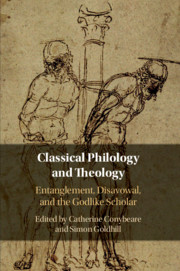Book contents
- Classical Philology and Theology
- Classical Philology and Theology
- Copyright page
- Contents
- Contributors
- Chapter 1 Philology’s Shadow
- Chapter 2 Philology’s Roommate: Hermeneutics, Antiquity, and the Seminar
- Chapter 3 The Union and Divorce of Classical Philology and Theology
- Chapter 4 The Philology of Judaism: Zacharias Frankel, the Septuagint, and the Jewish Study of Ancient Greek in the Nineteenth Century
- Chapter 5 Source, Original, and Authenticity between Philology and Theology
- Chapter 6 Whose Handmaiden? ‘Hellenisation’ between Philology and Theology
- Chapter 7 Julian the Emperor on Statues (of Himself)
- Chapter 8 Boethius in the Genres of the Book: Philology, Theology, Codicology
- Chapter 9 Virgil, Creator of the World
- Chapter 10 Theology’s Shadow
- Bibliography
- Index
Chapter 4 - The Philology of Judaism: Zacharias Frankel, the Septuagint, and the Jewish Study of Ancient Greek in the Nineteenth Century
Published online by Cambridge University Press: 03 September 2020
- Classical Philology and Theology
- Classical Philology and Theology
- Copyright page
- Contents
- Contributors
- Chapter 1 Philology’s Shadow
- Chapter 2 Philology’s Roommate: Hermeneutics, Antiquity, and the Seminar
- Chapter 3 The Union and Divorce of Classical Philology and Theology
- Chapter 4 The Philology of Judaism: Zacharias Frankel, the Septuagint, and the Jewish Study of Ancient Greek in the Nineteenth Century
- Chapter 5 Source, Original, and Authenticity between Philology and Theology
- Chapter 6 Whose Handmaiden? ‘Hellenisation’ between Philology and Theology
- Chapter 7 Julian the Emperor on Statues (of Himself)
- Chapter 8 Boethius in the Genres of the Book: Philology, Theology, Codicology
- Chapter 9 Virgil, Creator of the World
- Chapter 10 Theology’s Shadow
- Bibliography
- Index
Summary
This chapter investigates the specific philological practice of textual criticism and explores how this highly valued methodology was adopted by Jewish scholars working in the German-speaking world of the nineteenth century as part of the modernizing intellectual movement of Wissenschaft des Judentums, ‘The Scholarship of Judaism’. It explores how this move towards modernity depended on specific methodological engagement with a classical past. In particular, it focuses on how one leading rabbi and scholar, Zacharias Fraenkel, studied Greek philology in order to redraft Christian supersessionist historiography, which in the nineteenth century was composing a particular but profoundly distorting historical account of early Judaism, based on new philological methods. Fraenkel used philology to create a theologically-laden account of ancient Jewish society not as a dying religion but as a vital creative culture.
Keywords
- Type
- Chapter
- Information
- Classical Philology and TheologyEntanglement, Disavowal, and the Godlike Scholar, pp. 63 - 85Publisher: Cambridge University PressPrint publication year: 2020

